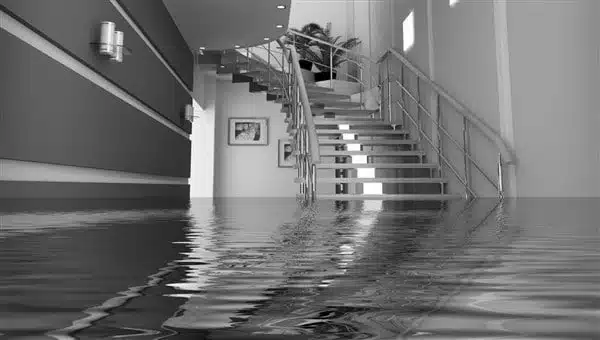As a new homeowner, you’re likely already facing a long list of responsibilities. Adding the potential for plumbing problems may seem like a daunting task. But worry not! Preventing flooding from plumbing issues in your home is not as complicated as it might seem. With some preventive measures and basic knowledge, you can handle minor plumbing issues and significantly reduce your risks with a flood prevention system.
Table of Contents
Prevent Plumbing Disasters with These Tips
Flooding in your home can be an uninvited guest due to various culprits such as pipe leaks, an overflowing toilet, or a stubborn, backed-up drain. These unwelcome incidents can be mitigated with a bit of proactive home management. Get to know the lay of the land in your home’s plumbing system, especially where your main water shut-off valve resides. This is like having a superhero’s power switch right at your fingertips.
In case of a leak going from minor to major, you can leap into action, shut off the water supply, and prevent any potential water damage from escalating into a full-blown disaster. Imagine that: you, the hero, saving the day from the villainous leaks. You’d be surprised how this simple knowledge can put you in control and save you from the headache of dealing with extensive water damage.
Regular Inspection and Maintenance
Ever consider yourself a detective? With some minor detective work around your home, you can prevent plumbing problems before they turn disastrous. Regular inspections of your plumbing system can play a critical role in keeping your home flood-free.
Adopt the Sherlock Holmes persona and start looking for clues around your house. Do your pipes show signs of corrosion or damage? Is there an unexplained pool of water near your water heater? Are there damp spots or rust around your fixtures? These could be tell-tale signs of a leak waiting to happen.
Regular maintenance is another key aspect of your home’s flood prevention system. Think of it as providing your plumbing system with a spa day. Show it some love by ensuring it is in good working condition. Just like you would service your car to keep it running smoothly, your plumbing system also needs regular upkeep. Don’t wait for your water heater to start belting out a solo performance of ‘Titanic’ in your basement. If it shows signs of leakage or rust, call in a professional to give it the TLC it needs.
Remember, your home’s plumbing system might not always communicate in words, but it sure does give signs. Keep an eye out for these clues. This way, you won’t just be a homeowner, you’ll be a home protector. Just like that, with a little detective work and some regular maintenance, you’ve mastered the art of preventing home flooding. So grab your detective hat and wrench, and let’s keep that water where it belongs – in the pipes!

Installation of Water Detection Devices
Imagine having a sentry standing guard, alert and ready to sound the alarm at the first sign of danger. That’s precisely what water detection devices do for your home. They are like your loyal guardsmen, tirelessly monitoring moisture levels and humidity changes to warn you of impending leaks or floods. Picture these gadgets as the secret agents of your home’s defense mechanism, silently observing and reporting suspicious activities to you.
Some high-tech devices take their jobs one step further by not only detecting the threat but also acting upon it. They can cut off the main water supply if they sense a leak, effectively nipping the problem in the bud before it evolves into a full-scale water disaster. The power of modern technology, right?
Install these faithful guardians in critical areas like near your washing machine, dishwasher, or water heater. These are the areas most likely to stage a water coup. Protect them, and you protect your entire kingdom from unexpected water damage.
So why not add these handy devices to your home protection arsenal? It’s like having a personal butler who’s always on duty, making sure your home stays dry and safe. Now that’s what we call peace of mind!
Related Content: Leak Detection Devices
Upgrade Your Plumbing System
Is your home somewhat of a relic, boasting charming antique features but also possessing dated plumbing systems? If so, an upgrade might be in order. You wouldn’t still be using a rotary dial phone, would you? Then why continue with archaic plumbing that might be on the brink of staging a water revolt?
Consider trading those rusty old pipes, valves, and fixtures for new, modern alternatives. It’s like swapping a vintage bicycle for a sleek sports car. Making the switch to PVC pipes, for example, can be a game-changer. These pipes are like the bodybuilders of the plumbing world, robust and resistant to corrosion.
Think of this upgrade as not only a safety measure to prevent water disasters, but also an investment. Just like a brand-new kitchen can boost your property value, so can a modernized plumbing system. It’s a win-win: you increase your home’s worth while securing peace of mind, knowing you’ve reduced the chance of unexpected plumbing issues.
Remember, this isn’t about denying your home’s character and charm, but enhancing it. After all, no one admires a beautiful historic house when it’s underwater due to faulty plumbing. Preserve your home’s charisma and ensure its longevity by embracing the advantages of modern plumbing technology.
Just like you, your home deserves to keep up with the times. So consider upgrading your plumbing system – it’s about safety, value, and maintaining the charm of your treasured home. Now isn’t that something to think about?
Purchase a Good Home Insurance Policy
As you arm yourself with a flood prevention system, let’s not forget another shield in your arsenal – a robust home insurance policy. Think of it as an invisible safety net, ready to catch you if a water calamity manages to slip past your defenses. This policy can potentially save you from financial strain by covering damages caused by those unexpected leaks or floods.
When it comes to insurance, knowledge is power. Take the time to become well-versed in your policy’s particulars. Do you know the difference between replacement cost and actual cash value coverage? Are sewer backups covered? Is there a separate deductible for water damage? These are important questions to ask. Understanding the ins and outs of your policy can make all the difference when a water mishap strikes.
A comprehensive home insurance policy isn’t just about paying a premium and filing a claim when disaster strikes. It’s about understanding your coverage and knowing how it can work for you in a time of need. Don’t shy away from asking questions or seeking clarification from your insurance provider. A well-informed homeowner is a well-prepared homeowner.
Securing your home with a good insurance policy is like purchasing an umbrella before the forecast calls for rain. You hope you won’t need it, but you’re sure glad to have it when those first raindrops start to fall. And remember, this isn’t a one-time task. As your circumstances change and your home evolves, so too should your coverage.
Regularly review your policy to ensure it aligns with your needs. Keep in mind that the best defense is a good offense. So go on, arm yourself with knowledge, ensure you’re adequately covered, and continue your conquest against home flooding.
Flood Prevention System: Calling a Professional
Just like you wouldn’t perform surgery on yourself, there are certain plumbing situations where it’s best to call in the pros. Sure, you’ve got the basics covered – you can handle that drip-drip-dripping faucet, or face down a clogged drain like a champ. But when the waters start getting deep, it’s time to send up the Bat-Signal for a seasoned plumber.
Persistent leaks, consistently low water pressure, or drains behaving like they’re auditioning for a horror movie – these are your red flags. It’s your home’s way of telling you it needs more than just your loving care. It needs the expertise of a seasoned professional who can navigate the twists and turns of complex plumbing systems.
Professional plumbers are like the super sleuths of the home repair world. They possess the skills and tools to sniff out and solve plumbing mysteries that could otherwise lead to a soggy disaster. By calling in a pro when things get tough, you’re not only avoiding potential water damage but also buying yourself peace of mind.
It’s like calling in the cavalry when the battle gets too intense. You’ve held the fort long enough, now it’s time to hand the reins over to a professional. This way, you ensure that your home remains your sanctuary, safe from the destructive forces of unwanted water invasions.
FAQs
Can a plumber detect leaks behind walls?
Professional plumbers now use a variety of methods to detect water leaks in walls. Listening discs and ground microphones are the most prevalent and widely utilized devices for detecting water leaks. However, there are several sensors available that are quite good at detecting such leaks.
How do plumbers repair leaks behind walls?
Again, plumbing contractors will typically bring their own camera to find the leak. Once your plumbers have identified the source of the leak, they will proceed to repair it. They may need to cut through the drywall to fix the problem. It may be as simple as replacing a fitting or worn-out pipe, or mending a hole or crack.
What to do if the bathroom leaks through the ceiling?
A licensed plumber can swiftly repair it, preventing costly water damage. A clogged drain can also cause water to pour into your ceiling. If the tub pan overflows, water seeps into the floor/ceiling and becomes visible from below. A leaky gasket at the shower drain could also have caused the water damage.
Conclusion
So, keep your hero cape handy for minor fixes but know when to phone a friend for the major issues. It’s about balancing do-it-yourself bravado with smart decision-making. After all, even superheroes know when to call for backup. So keep the plumber’s number on speed dial – it’s your final line of defense against a watery onslaught.
